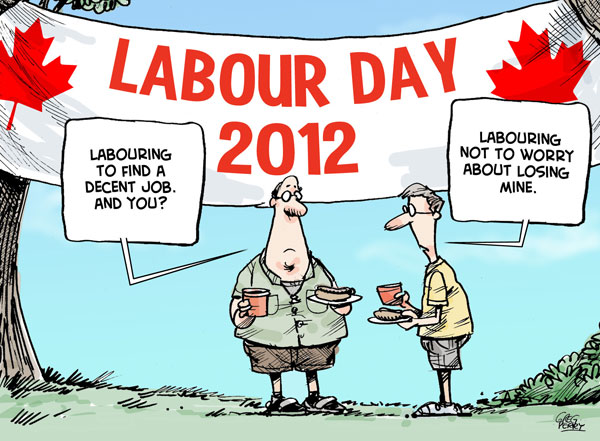The origins of Labour Day in Canada trace back 140 years to 1872 and a parade held in support of a Toronto union's strike for a 58-hour work week. Back then, union activity was illegal in Canada and 24 workers were jailed for their role in the strike.
An outcry of support and rally on Sept. 3 of 1873 led Prime Minister John A. MacDonald to commit to repealing the law banning union activity, helping to lay the groundwork for real progress for working people.
Since 1894, when Prime Minister John Thompson declared Labour Day an official holiday, working people have celebrated our gains and honored those who fought for the rights and privileges we enjoy today.
Unfortunately, the last 30 years has seen a troubling growth in inequality in our society.
From World War II through 1980, working people shared equally in the gains of productivity with shareholders and owners through higher wages and improved purchasing power. But from 1980 forward, while productivity increased at an even greater rate, workers' wages stagnated and all gains of productivity have gone to owners and senior executives.
Today's middle class family feels like they are having a harder time making ends meet, because they are. Meanwhile, the rich have never been so rich.
Signs of hope
On this Labour Day, however, I look forward with optimism that we are turning a corner towards greater equality.
Front-line workers in B.C.'s public service are negotiating for fair and reasonable wage increases. And despite the intransigence of Christy Clark and Kevin Falcon, polling consistently shows that women and men across British Columbia support these workers in their simple demand to not fall further behind or lose rights they and their predecessors fought to secure.
British Columbians want a fair and equitable society, and they recognize that the front-line workers in our schools, hospitals, and social and government services are an important part of that society.
In the private sector, workers are once again negotiating agreements that see them share in the gains of their productivity and the value of their work. Recent agreements between workers and companies like Rio Tinto and Teck Resources have put more income in the pockets of workers, and boosted the fortunes of local communities.
The power of local investment
Tax cuts for corporations and the wealthy are too often invested in overseas companies or simply held as cash, creating no local economic activity. But when working people earn more, they tend to spend it in their own communities.
Just ask business owners in Trail, where employees of Teck Resources, represented by the United Steelworkers, negotiated a $10,000 signing bonus earlier this year. Trail businesses in every sector, from auto sales to restaurants to retail, immediately reported a significant increase in economic activity in their community.
These agreements are setting a pattern for wage growth for all working people, whether in a union or not. This is good news for working and middle class families and it's also good news for our economy.
Liveable communities are anchored in a strong middle class and it was unions who were responsible for the development of the middle class.
This Labour Day, as investment bankers and CEOs fight to hold on to a greater and greater share of the wealth working people generate, unions remain as relevant as they were 140 years ago when our predecessors fought to reduce the work week to fewer than 60 hours.
We continue to fight for better work and better lives for all Canadians, and I am hopeful that we are turning a corner towards better times for us all.
On Monday, SFU Professor of History Mark Leier compares the roots of two days dedicated to workers and their rights: May Day and Labour Day. ![]()
Read more: Rights + Justice, Labour + Industry















Tyee Commenting Guidelines
Comments that violate guidelines risk being deleted, and violations may result in a temporary or permanent user ban. Maintain the spirit of good conversation to stay in the discussion.
*Please note The Tyee is not a forum for spreading misinformation about COVID-19, denying its existence or minimizing its risk to public health.
Do:
Do not: